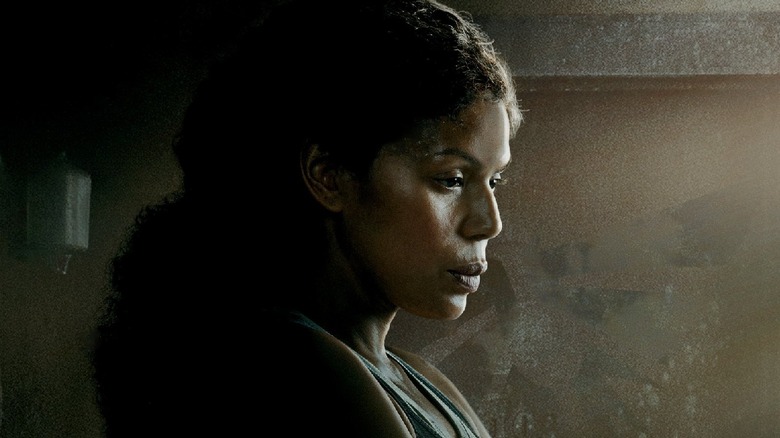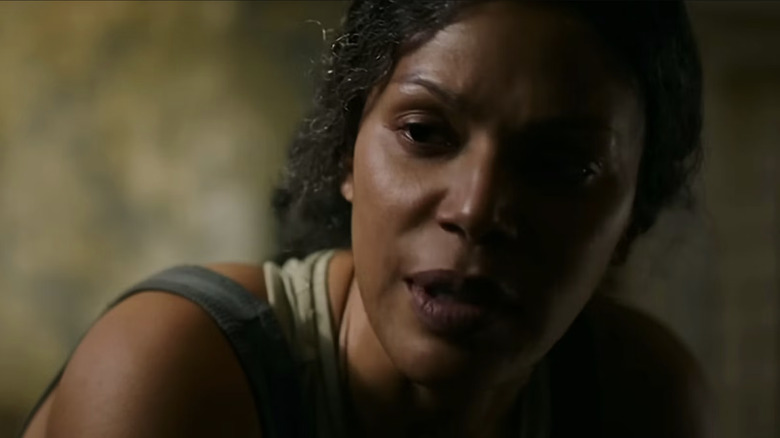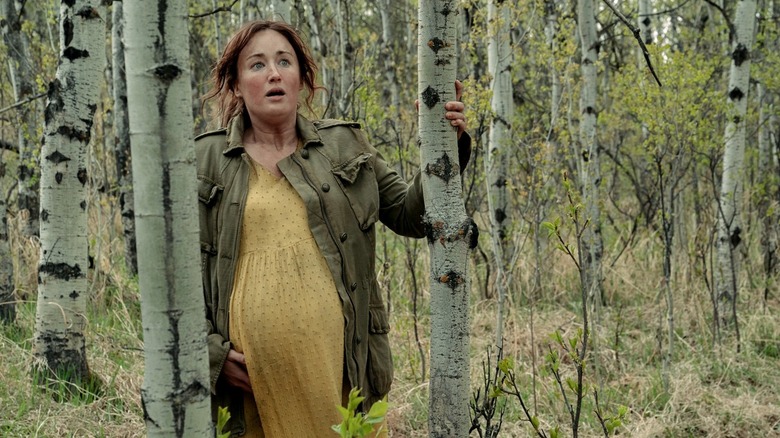The Last Of Us Finale Explores, And Explains, A Key Character Relationship
This post contains major spoilers for the season finale of "The Last of Us."
Right before the dramatic climax, "The Last of Us" season finale gives us one final cold open, which is something we haven't seen from the show since its opening few episodes. Before, the cold opens were effectively used to take the audience briefly out of Joel (Pedro Pascal) and Ellie's (Bella Ramsey) perspective to show us the origins of the Cordyceps infection and the failure to contain it (and they were a highlight, let's hope to see them come back in season 2!).
Here, this cold open holds a different purpose, and it's one that will either delight fans of the source material or divide them. We open on a flashback to a pregnant woman named Anna, excitingly played by Ellie's original performer from the game, Ashley Johnson. If you're a devoted fan, you might recognize that name from collectibles and optional material — as the introductory sequence unfolds, Anna turns out to be Ellie's mother. In a potentially controversial addition, the episode gives us an explanation for Ellie's immunity: during childbirth, Anna is attacked and bitten by an infected and is able to cut baby Ellie's umbilical cord.
However, that's not the sole reason why we've switched to Anna's perspective. After the intro sequence, we find out that Anna has been traveling with a group of survivors, including our future "Queen Firefly," Marlene (Merle Dandridge, reprising her original role). As it turns out, Marlene and Anna have shared a special, close friendship for their entire lives, and in Anna's last moments, she has a few requests for Marlene. Though it's nice to see Anna make an appearance in live action, the character this cold open serves to develop is not Ellie, it's Marlene.
Marlene and Anna's lifelong friendship
Before cutting back to Ellie and Joel, we watch Marlene fulfill Anna's dying wishes: to watch over Ellie, and to shoot Anna before she turns into an infected. Finally, viewers of the show have some context as to why Marlene had been watching over Ellie and enrolled her into FEDRA boarding school. While Marlene was out being a revolutionary, Ellie would be safer in a place the Fireflies would never attack.
Marlene doesn't have as much of a presence as Joel in the long term narrative of "The Last of Us," but when it comes to the ending's moral dilemma (which changes the entire context of the story), her role, especially as Joel's direct character foil, is just as significant. As Ellie is unconscious and is getting prepped for a fatal surgery that could reverse-engineer a cure, Joel claims that she doesn't know what's at stake. In the game, Marlene makes subtle references that she knows exactly how Joel feels, but the player never gets the full extent of what she means unless they engage with optional voice recordings and diary collectibles throughout the final level. Thanks to the additional cold open in the HBO adaptation, we know exactly what Marlene means — in fact, as Ellie's distant guardian, we're shown, not told, that she may be the only one who truly understands Joel's pain.
At the end of the day, Marlene is an incredibly principled character and is fully devoted to her cause to restore what's left of society. To her, the needs of the many outweigh the few. Despite what Joel thinks of her at this moment, her choice to sacrifice Ellie in pursuit of a cure is not something that's easy for her.
Some adaptational sacrifices were made
Although this series has put Anna and Marlene's friendship onscreen for the very first time, and therefore, made it more explicit than ever before — it did end up doing so by erasing some little nuances the game had. In the pilot episode, it's established that while Marlene has always known Ellie, Ellie has never met Marlene personally before. In the source material, Marlene is one of the closest things Ellie has had to a positive authority figure in her life. She's distant and often too occupied with her rebellion to watch over Ellie, but there's a lot of trust between the two before Marlene hands Ellie over to Joel. In the show, Ellie's emotional bond with Marlene is practically non-existent.
As the player dives into the expanded canon, such as the "Left Behind" DLC and the canon "The Last of Us: American Dreams" comic, they can find even more hints into the friendship between Marlene and Anna. My personal favorite is a hidden piece of dialogue, which parallels Marlene and Anna's bond with Ellie's relationship with Riley, two generations of female friendship strengthened by the apocalypse. Although these details are relatively minor in the grand scope of "The Last of Us," they are something that gives the world and the character dynamics so much more depth and subtext.
Marlene is driven by Anna's love
Ultimately, like many other big adaptational works, it's all a trade-off. Marlene and Anna's relationship is probably richer in the original game, but in the series, it's crucial that it is shown and not just told through supplemental material. There's pros and cons to both takes. The choice to cold open the finale on a flashback to Anna's past was ultimately the right decision for the show and its needs. It both enriches Marlene, a character we haven't gotten the luxury to know since the pilot episode, as well as honors Ashley Johnson's legacy as Ellie, one of the most beloved characters in the history of video games.
"The Last of Us" is about many things, but importantly, it's about how morals are so deeply intertwined with perspective; how every single person in this world is interconnected through love or through pain. As we watch Marlene confront Joel, showrunners Neil Druckmann and Craig Mazin want us to know that she's driven by love — Anna's love.



